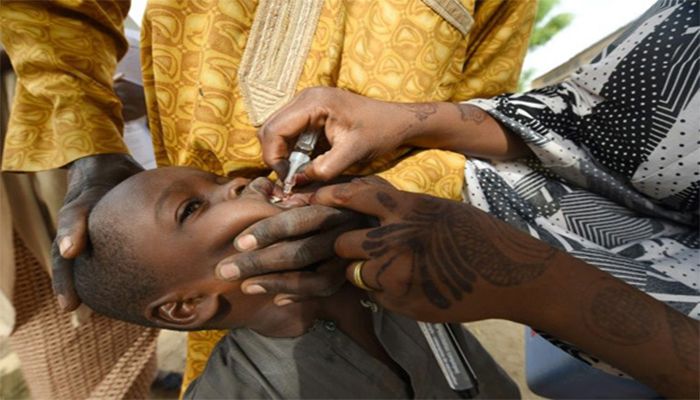
Desk Report
Publish: 25 Aug 2020, 12:30 pm

The World Health Organization (WHO) is expected to announce on Tuesday that the African continent is free of wild polio, four years after the most reported outbreaks have arisen in north-eastern Nigeria, reports AFP.
“Thanks to the relentless efforts by governments, donors, frontline health workers and communities, up to 1.8 million children have been saved from the crippling life-long paralysis,” the WHO said in a statement.
The official announcement is expected at 1500 GMT at a videoconference with WHO Director-General Tedros Adhanom Ghebreyesus and main personalities including philanthropist and Microsoft founder Bill Gates.
“Happiness is an understatement. We’ve been on this marathon for over 30 years,” said Tunji Funsho, a Nigerian doctor and local anti-polio coordinator for Rotary International.
He said it marked a crucial step in the total eradication of the illness at the global level.
“It’s a real achievement, I feel joy and relief at the same time,” he added.
Poliomyelitis or "wild polio" is a highly dangerous and viral illness that affects the spinal cord and induces permanent paralysis in babies.
This was widespread across the globe before the vaccine was discovered in the 1950s, but it was out of control for several developing countries in Asia and Africa.
As late as 1988, the WHO counted 350,000 cases worldwide, and more than 70,000 cases were registered in Africa alone in 1996.
Thanks to a remarkable illustration of concerted political action and financial support — about $19 billion over 30 years — only Afghanistan and Pakistan have reported cases this year: 87 in total.
– Trust –
Nigeria, a country with 200 million inhabitants, was still among the trouble-spots in the early 2000s.
In its northern Muslim-majority areas, the government were pressured to suspend vaccine drives in 2003 and 2004 by Islamic militants who believed it was a massive plot to sterilize young Muslims.
It took a tremendous effort, in conjunction with tribal elders and religious figures, to persuade citizens that the vaccination was safe.
“People trust their local traditional leaders who live with them more than the political leaders,” said Grema Mundube, a community leader in the town of Monguno, in the far north of Nigeria.
“Once we spoke to them and they saw us immunising our children they gradually accepted the vaccine,” he told AFP.
However, the emergence of violent Islamist group Boko Haram in 2009 caused another rupture in the programme. In 2016, four new cases were discovered in Borno state in the northeast in the heart of the conflict.
“At the time, we couldn’t reach two-thirds of the children of Borno state — 400,000 children couldn’t access the vaccine,” said Dr Funsho.
– Inaccessible children –
The security situation remains highly volatile in the region, with the jihadists of Boko Haram and a local Islamic State affiliate controlling vast areas around Lake Chad and the border with Niger.
“International agencies, local governments, donors — all partners took the bull by the horns to find new strategies to manage to reach these children,” said Dr Musa Idowu Audu, coordinator for the WHO in Borno.
In these “partially accessible” areas, vaccination teams worked under the protection of the Nigerian army and local self-defence militias.
Throughout regions entirely dominated by jihadis, the WHO and its allies tried to track citizens entering and exiting the economy and travel networks in an attempt to disseminate scientific knowledge and hire government sources that might warn them of any polio outbreaks.
“We built a pact of trust with these populations, for instance by giving them free medical supplies,” said Dr Audu.
Today, it is thought that only 30,000 children are currently "inaccessible": a figure deemed sufficiently small by science to encourage an outbreak to break out.
Despite Dr. Audu's "strong joy and gratitude," he also refuses to note the 20 or more medical personnel and volunteers killed for the cause in north-eastern Nigeria in recent years.
The challenge now is to ensure that no new polio cases arrive from Afghanistan or Pakistan and that vaccinations continue to ensure that children across the continent are protected from this vicious disease.
“Before we couldn’t sleep at all. Now we will sleep with one eye open,” said Dr Funsho.
Subscribe Shampratik Deshkal Youtube Channel
© 2024 Shampratik Deshkal All Rights Reserved. Design & Developed By Root Soft Bangladesh